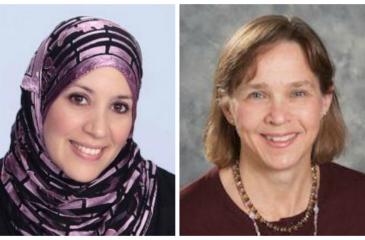Researcher-physicians Muna Sunni, MBBCH, of the University of Minnesota and Jennifer Kyllo, MD, from Children’s Hospitals and Clinics of Minnesota received a $200,000 Child Health Collaborative Grant Award to develop new diabetes educational materials targeted for Somali children in Minnesota.
“We’ve noticed that the Somali children we’re treating have worse diabetes control than their non-Somali counterparts, which we believe stems from a lack of culturally relevant education materials,” said Dr. Sunni, assistant professor of pediatrics in the University of Minnesota Medical School and physician at the University of Minnesota Masonic Children’s Hospital.
CTSI, the University’s Department of Pediatrics, and Children’s Hospitals and Clinics of Minnesota jointly created the program last fall to address important, unmet child health issues in Minnesota and encourage research collaborations between the organizations. On Sept. 1, the program’s inaugural awardees kicked off the project to help diabetic children in one of Minnesota’s largest immigrant communities.
“For years Children’s Hospitals and Clinics of Minnesota and the University of Minnesota have been helping kids control diabetes and live a healthier life. But in working with our community, we learned that there was room for improvement. This generous grant will help reduce the life-altering consequences of childhood diabetes,” said Rob Payne, MD, Medical Director for Research at Children’s Hospitals and Clinics of Minnesota.
Drs. Sunni and Kyllo will work with Somali parents of diabetic children to identify cultural gaps and barriers affecting care, like mealtime customs, religious practices, and food preferences. Educational materials will be produced in Somali, including videos, which will reach a larger audience and educate families that can’t read. They’ll also host a group discussion that enables affected families to share experiences and advice with one another.
“We hope these videos and other culturally relevant materials will be implemented in Somali communities across the U.S.,” said Dr. Kyllo, endocrinologist at Children’s Hospitals and Clinics of Minnesota. “By creating a model for educating Somali and other minority groups, we could make a huge impact on a wide range of health issues.”
The project’s highly collaborative nature also promises to add value. The grant concept emerged from discussions between Mark R. Schleiss, MD, Professor of Pediatrics and leader of the Child Health Initiative for CTSI for the University’s Clinical and Translational Science Institute, and Dr. Payne.
“We created this grant program with our partners within the University and at Children’s because we realized the tremendous potential that partnerships -- like the one Drs. Sunni and Kyllo formed -- have in tackling child health issues,” said Dr. Schleiss.
Through the Child Health Collaborative Grant, CTSI and its community research partners will continue to fund future research collaborations outside the University that address important, unmet child health issues in Minnesota. It will be awarded every two years.
Visionaries behind the grant program hope it will be yet another thread that unites child health specialists across the state in their shared mission of improving the quality of – and access to – care.
